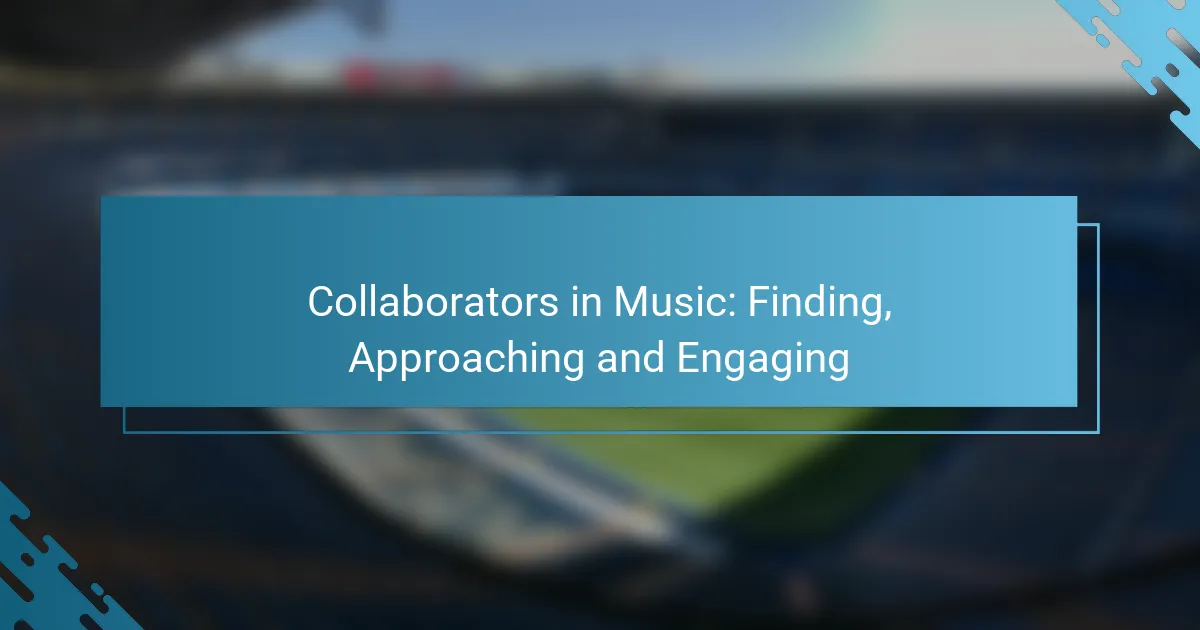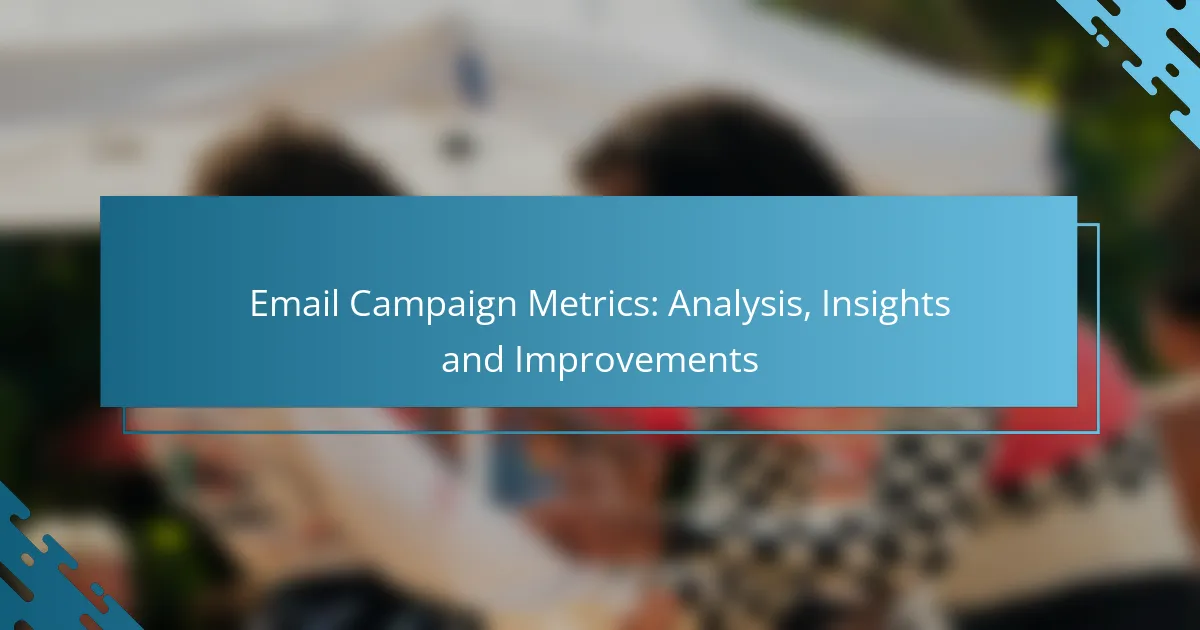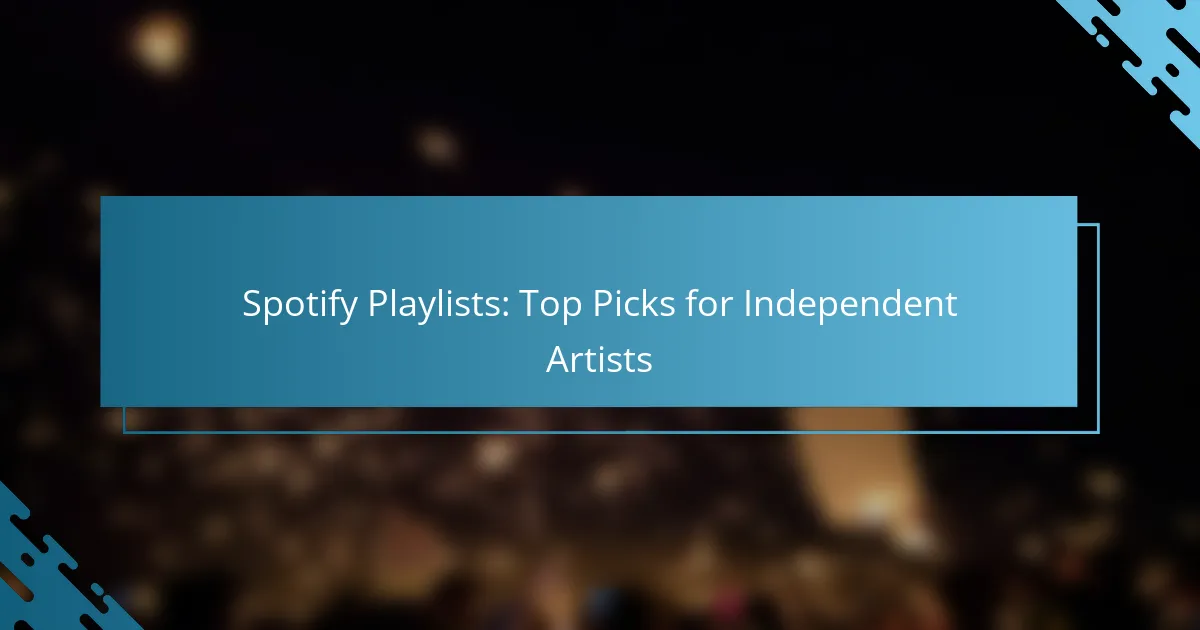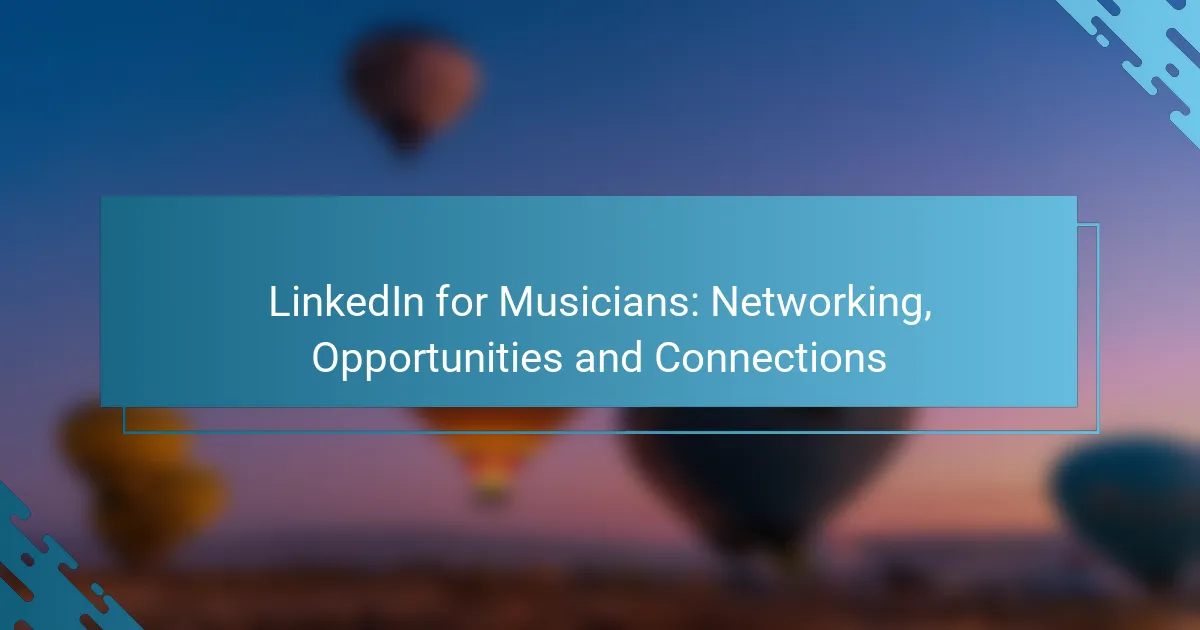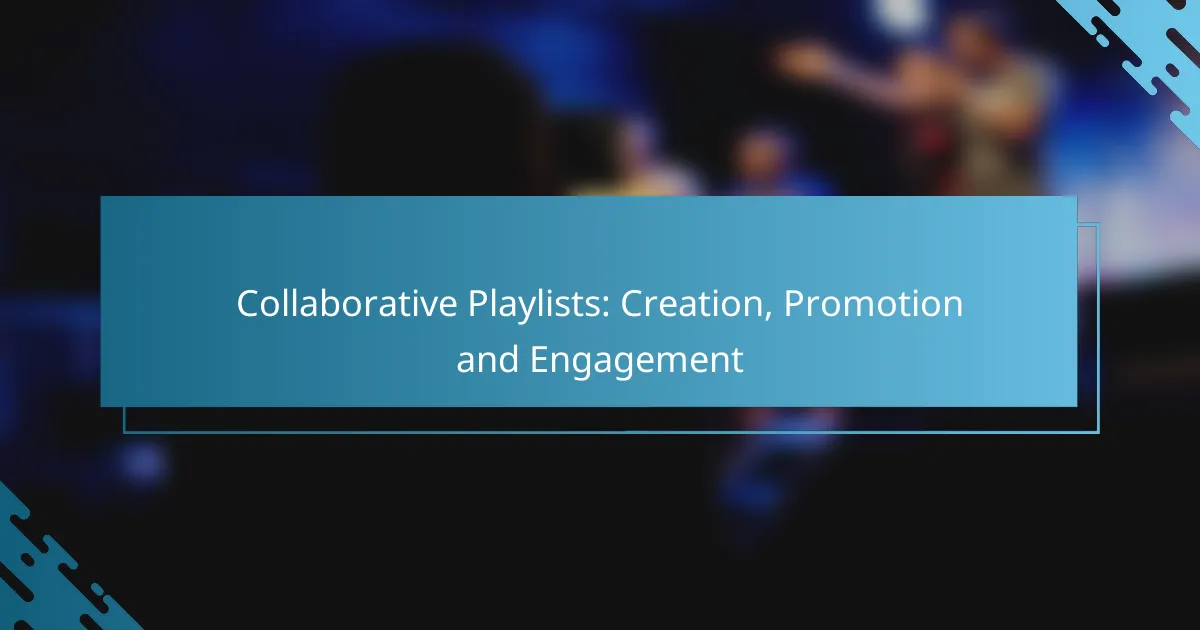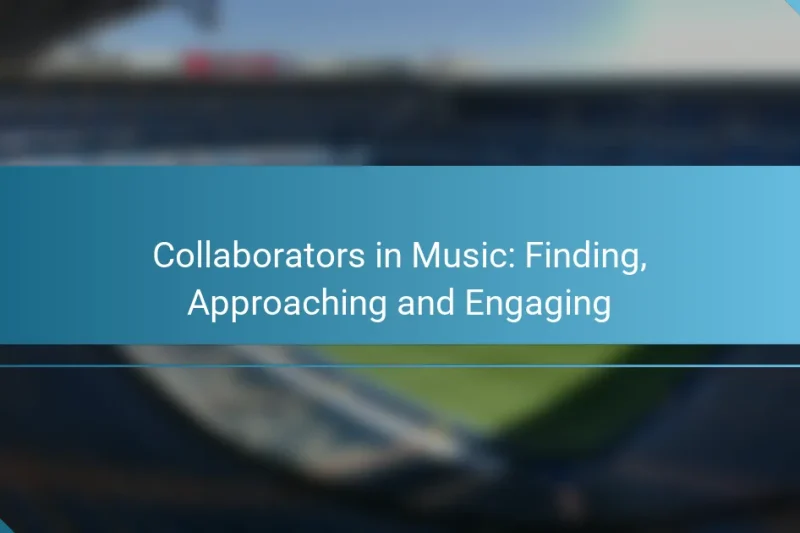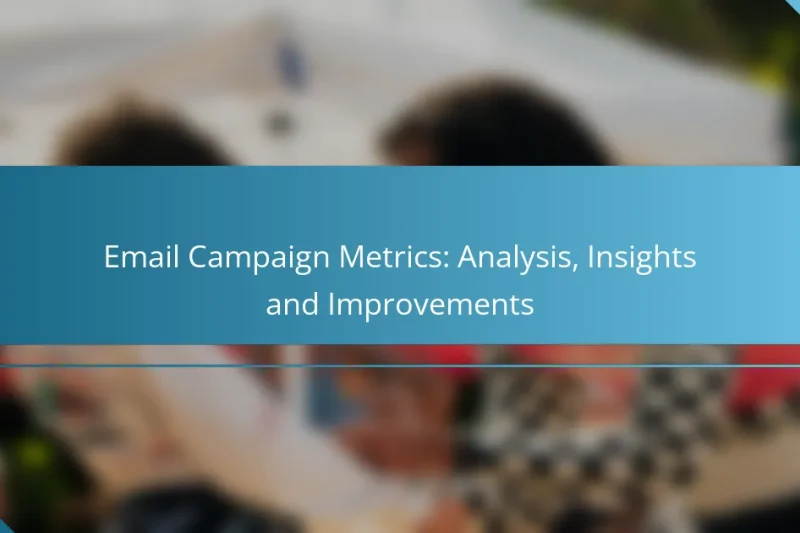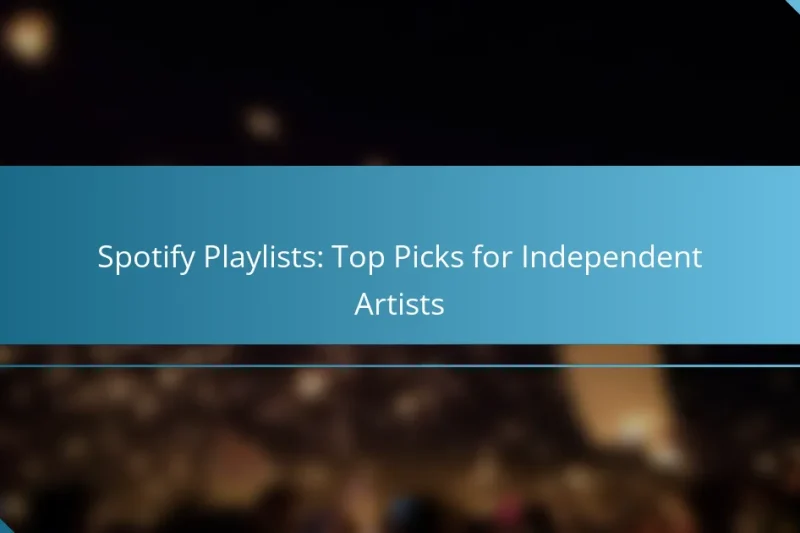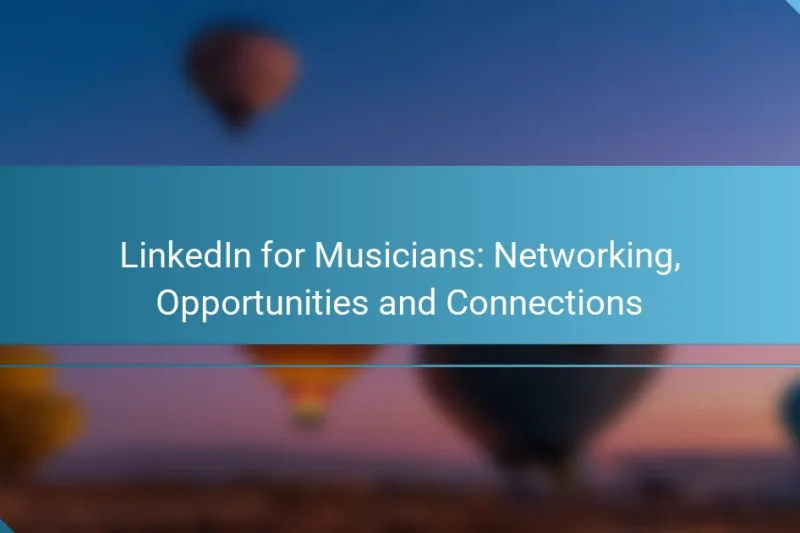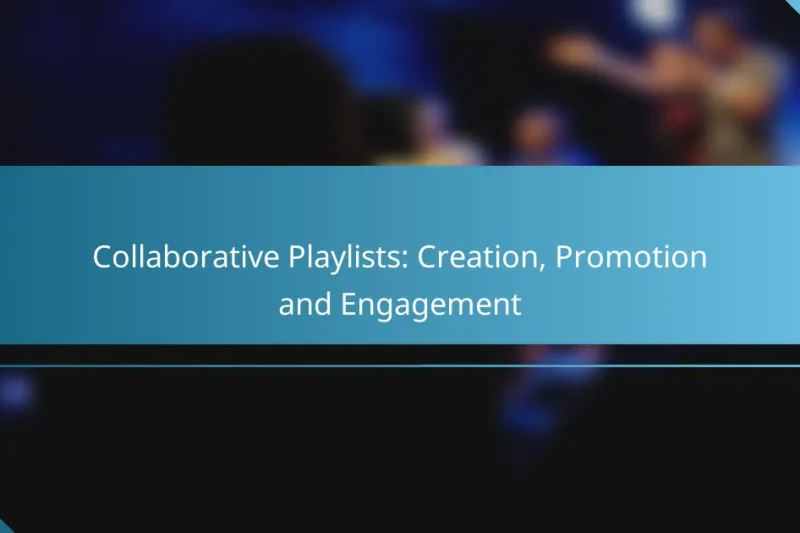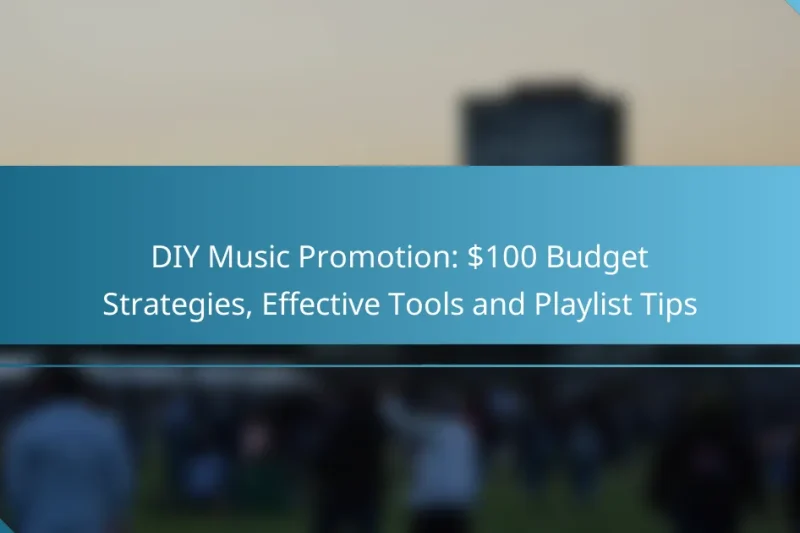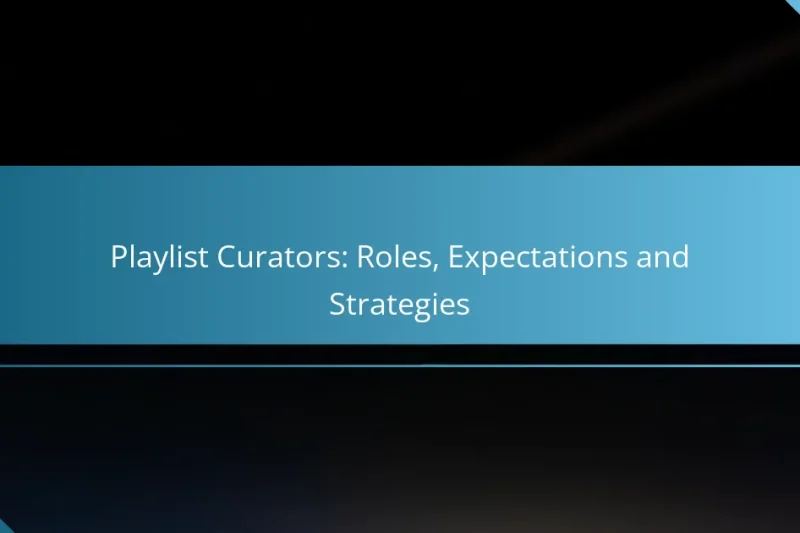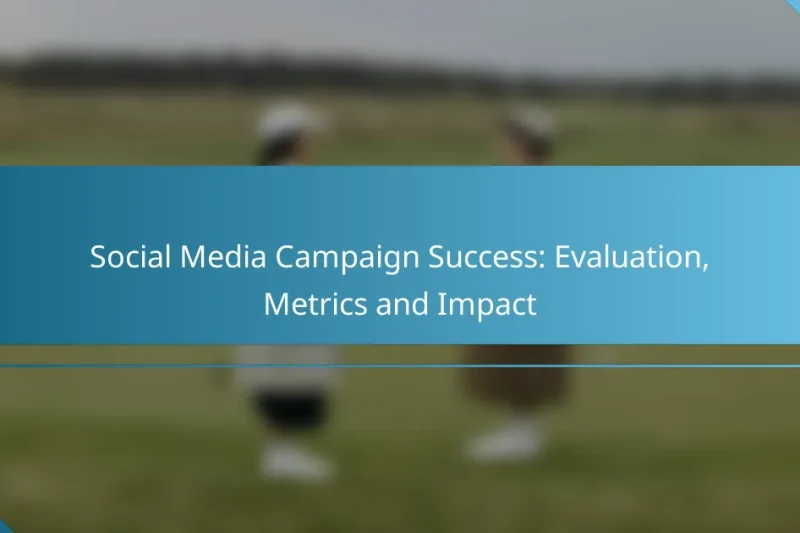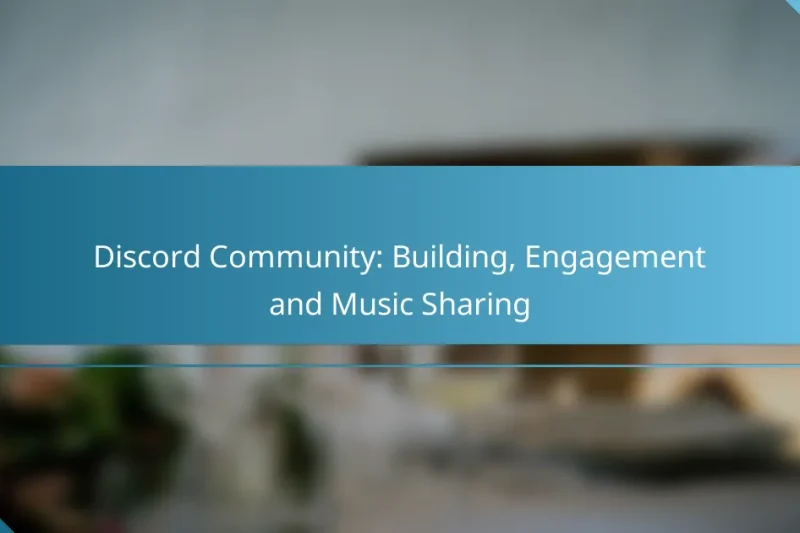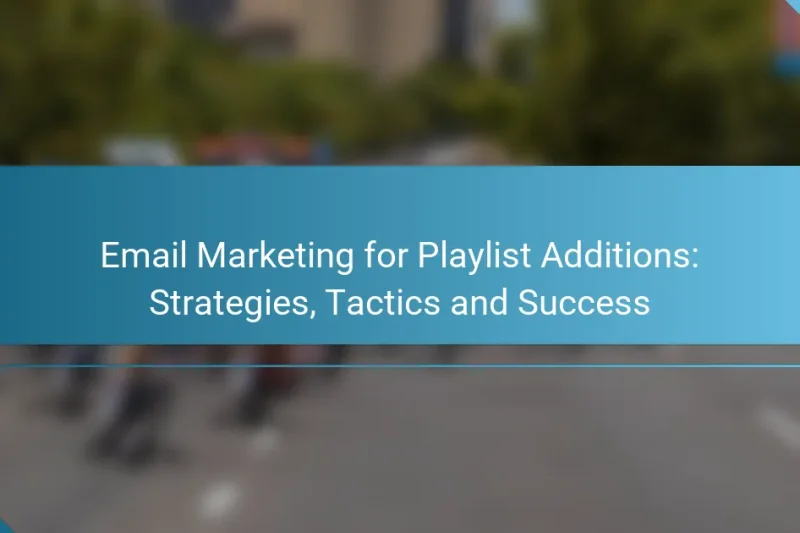Collaborating in music can significantly enhance creativity and lead to innovative projects. To find the right … Collaborators in Music: Finding, Approaching and EngagingRead more
DIY music promotion is essential for independent artists looking to expand their reach and connect with fans while maintaining control over their brand. By implementing effective playlist strategies and leveraging various platforms, you can enhance your visibility and engagement with your target audience. This guide will provide you with the tools and techniques necessary to navigate the world of music promotion successfully.
Email Campaign Metrics: Analysis, Insights and Improvements
Email campaign metrics are crucial for assessing the success of your marketing efforts. By analyzing key … Email Campaign Metrics: Analysis, Insights and ImprovementsRead more
Spotify Playlists: Top Picks for Independent Artists
Spotify playlists offer independent artists a valuable opportunity to gain exposure and connect with new listeners. … Spotify Playlists: Top Picks for Independent ArtistsRead more
LinkedIn for Musicians: Networking, Opportunities and Connections
LinkedIn offers musicians a powerful platform to build a professional presence and connect with industry professionals. … LinkedIn for Musicians: Networking, Opportunities and ConnectionsRead more
Collaborative Playlists: Creation, Promotion and Engagement
Collaborative playlists on Spotify offer a unique way for multiple users to share and enjoy music … Collaborative Playlists: Creation, Promotion and EngagementRead more
DIY Music Promotion: $100 Budget Strategies, Effective Tools and Playlist Tips
Promoting your music on a $100 budget is entirely feasible with the right strategies and tools. … DIY Music Promotion: $100 Budget Strategies, Effective Tools and Playlist TipsRead more
Playlist Curators: Roles, Expectations and Strategies
Playlist curators play a crucial role in the music industry by selecting and organizing tracks that … Playlist Curators: Roles, Expectations and StrategiesRead more
Social Media Campaign Success: Evaluation, Metrics and Impact
Evaluating the success of social media campaigns is crucial for understanding their impact and effectiveness. By … Social Media Campaign Success: Evaluation, Metrics and ImpactRead more
Discord Community: Building, Engagement and Music Sharing
Building a Discord community is about creating a welcoming space where members can connect over shared … Discord Community: Building, Engagement and Music SharingRead more
Email Marketing for Playlist Additions: Strategies, Tactics and Success
Email marketing is a powerful tool for musicians looking to boost their playlist additions by fostering … Email Marketing for Playlist Additions: Strategies, Tactics and SuccessRead more
How Can DIY Music Promotion Boost Your Career?
DIY music promotion can significantly enhance your career by allowing you to reach a wider audience, engage directly with fans, and maintain control over your brand. By leveraging various platforms and strategies, you can create a personalized approach that resonates with your target listeners.
Increased audience reach
DIY music promotion enables artists to connect with a global audience without relying solely on traditional music industry channels. Utilizing social media platforms, music streaming services, and online communities can help you tap into diverse listener demographics. Consider using platforms like Spotify, YouTube, and SoundCloud to distribute your music widely.
Engaging with niche communities and genre-specific forums can further expand your reach. Collaborating with other artists or influencers can also introduce your music to new audiences, increasing your visibility and fan base.
Cost-effective marketing
DIY music promotion is often more affordable than traditional marketing methods, allowing you to allocate your budget more effectively. Many online tools and platforms offer free or low-cost options for promoting your music, such as social media ads or email marketing services. This approach can help you maximize your return on investment.
Consider utilizing free resources like social media, blogs, and music forums to promote your work. Investing in targeted ads on platforms like Facebook or Instagram can also yield significant results without breaking the bank.
Enhanced fan engagement
Engaging directly with your fans is a key advantage of DIY music promotion. By interacting with your audience through social media, live streams, and email newsletters, you can build a loyal community around your music. This personal connection can lead to increased support and word-of-mouth promotion.
Encourage fan participation by hosting Q&A sessions, sharing behind-the-scenes content, or creating exclusive fan clubs. These strategies can foster a deeper relationship with your listeners, making them more likely to support your music and share it with others.
Control over branding
With DIY music promotion, you maintain full control over your branding and image. This autonomy allows you to craft a unique identity that reflects your artistic vision and resonates with your target audience. You can choose how to present your music, from visuals to messaging.
Be consistent in your branding across all platforms, ensuring that your visuals, tone, and content align with your artistic persona. This coherence can strengthen your brand and make it more recognizable to fans.
Direct sales opportunities
DIY music promotion opens up direct sales opportunities, enabling you to sell your music and merchandise without intermediaries. Platforms like Bandcamp or your own website can facilitate direct transactions, allowing you to retain a larger share of the profits. This approach can be particularly beneficial for independent artists.
Consider offering exclusive merchandise or special editions of your music to incentivize purchases. Engaging with your audience through pre-orders or crowdfunding campaigns can also create a sense of community and support for your work.
What Are Effective Playlist Strategies for Independent Artists?
Effective playlist strategies for independent artists involve targeted submissions, building relationships with curators, utilizing social media, and creating personal playlists. These approaches can significantly enhance visibility and engagement with potential listeners.
Targeted playlist submissions
Targeted playlist submissions focus on identifying playlists that align closely with your music genre and style. Research playlists that feature similar artists and ensure your tracks fit the mood and theme of those playlists.
Use platforms like SubmitHub or Playlist Push to streamline your submissions, but always personalize your pitch. A well-crafted message can increase your chances of being added to a playlist.
Building relationships with curators
Building relationships with playlist curators is crucial for long-term success. Engage with them on social media, attend music events, and show genuine interest in their work to foster a connection.
Consider offering exclusive content or early access to new releases as a way to strengthen these relationships. A personal touch can make curators more inclined to support your music.
Utilizing social media for exposure
Social media is a powerful tool for promoting your music and playlists. Share your tracks, engage with followers, and use relevant hashtags to reach a broader audience.
Platforms like Instagram, TikTok, and Twitter can help you connect with fans and curators alike. Regularly post updates and behind-the-scenes content to keep your audience engaged and interested.
Creating your own playlists
Creating your own playlists can showcase your musical taste and introduce listeners to your work. Curate playlists that include your songs alongside tracks from other artists you admire or that complement your style.
Promote these playlists on your social media channels and encourage followers to share them. This not only increases your visibility but also positions you as a tastemaker within your genre.
Which Tools Can Help with Music Promotion?
Several tools can significantly enhance your music promotion efforts, making it easier to reach your target audience and gain traction. Utilizing the right platforms can streamline your process, improve your visibility, and ultimately help you grow your fanbase.
SubmitHub for playlist pitching
SubmitHub is a platform designed for artists to pitch their music directly to playlist curators and bloggers. By submitting your tracks, you can increase the chances of being featured on popular playlists, which can lead to greater exposure and streams.
When using SubmitHub, focus on crafting a compelling pitch and selecting curators whose playlists align with your genre. Keep in mind that the platform operates on a credit system, so plan your submissions wisely to maximize your reach.
Canva for promotional graphics
Canva is a user-friendly design tool that allows musicians to create eye-catching promotional graphics for social media, album covers, and flyers. With a wide range of templates and design elements, you can easily produce professional-quality visuals without needing extensive graphic design skills.
To make the most of Canva, consider your brand’s aesthetic and maintain consistency across all promotional materials. Utilize high-resolution images and clear fonts to ensure your graphics stand out and effectively communicate your message.
Hootsuite for social media management
Hootsuite is a comprehensive social media management tool that helps you schedule posts, track engagement, and analyze performance across multiple platforms. This can save you time and ensure a consistent online presence, which is crucial for music promotion.
When using Hootsuite, take advantage of its analytics features to understand what content resonates with your audience. Regularly adjust your strategy based on these insights to optimize your social media efforts and increase your fan engagement.
Mailchimp for email marketing
Mailchimp is an email marketing service that allows musicians to build and manage mailing lists, send newsletters, and track campaign performance. This tool is essential for keeping your fans informed about new releases, shows, and other updates.
To effectively use Mailchimp, segment your audience based on their preferences and engagement levels. Personalizing your emails can lead to higher open rates and better connections with your fans, ultimately driving more traffic to your music and events.
What Are the Best Practices for Engaging with Fans?
Engaging with fans is essential for building a loyal audience and promoting your music effectively. Best practices include consistent communication, interactive content, and leveraging fan insights to strengthen connections.
Regular updates and content sharing
Regularly sharing updates keeps your fans informed and engaged. Consider posting new music releases, behind-the-scenes content, or personal stories that resonate with your audience. Aim for a consistent schedule, such as weekly or bi-weekly updates, to maintain interest.
Utilize various platforms like social media, newsletters, and your website to reach different segments of your audience. For example, Instagram Stories can showcase quick updates, while a monthly newsletter can provide in-depth insights.
Hosting live Q&A sessions
Live Q&A sessions allow fans to interact directly with you, fostering a sense of community. Use platforms like Instagram Live or Facebook Live to host these sessions, where fans can ask questions in real-time. Schedule these events regularly to build anticipation.
Promote your Q&A sessions in advance to maximize participation. Consider using polls to gather questions beforehand, ensuring you address topics that matter most to your audience.
Offering exclusive content
Exclusive content can significantly enhance fan loyalty. This might include early access to new tracks, special merchandise, or behind-the-scenes videos. Consider creating a membership program or a Patreon page where fans can subscribe for exclusive perks.
Make sure to communicate the value of this exclusive content clearly. For instance, if you release a limited edition track, highlight its uniqueness and the limited time it will be available to encourage prompt engagement.
Utilizing fan feedback
Actively seeking and utilizing fan feedback can enhance your music and promotional strategies. Use surveys or social media polls to gather insights on what fans enjoy or want to see more of. This not only improves your offerings but also makes fans feel valued.
When implementing feedback, communicate changes back to your audience. For example, if fans express interest in a specific genre, consider incorporating that into your next project and let them know their input influenced your decision.
How Do You Measure the Success of Your Promotion Efforts?
Measuring the success of your music promotion efforts involves analyzing various metrics that reflect audience engagement and reach. Key indicators include streaming numbers, playlist placements, social media interactions, and sales figures.
Key Metrics to Track
To effectively measure success, focus on metrics such as total streams, downloads, and playlist placements. Additionally, monitor social media engagement rates, including likes, shares, and comments, as these can indicate audience interest and interaction.
Consider using analytics tools provided by platforms like Spotify for Artists or Apple Music for Artists. These tools can give you insights into listener demographics, geographic locations, and listening habits, helping you refine your promotional strategies.
Setting Goals and Benchmarks
Establish clear goals for your promotion efforts, such as increasing streams by a certain percentage or gaining a specific number of playlist placements. Benchmarks can vary; for instance, aiming for a 20-30% increase in streams over a few months is a reasonable target.
Regularly review your progress against these goals to assess what strategies are working and where adjustments are needed. This iterative approach allows you to stay agile and responsive to audience feedback and trends.
Common Pitfalls to Avoid
Avoid focusing solely on vanity metrics, such as follower counts, without considering engagement quality. High follower numbers do not always translate to meaningful interactions or sales.
Additionally, don’t neglect the importance of organic growth. While paid promotions can boost visibility, relying too heavily on them may lead to unsustainable results. Balance your strategy with authentic engagement and community building.
